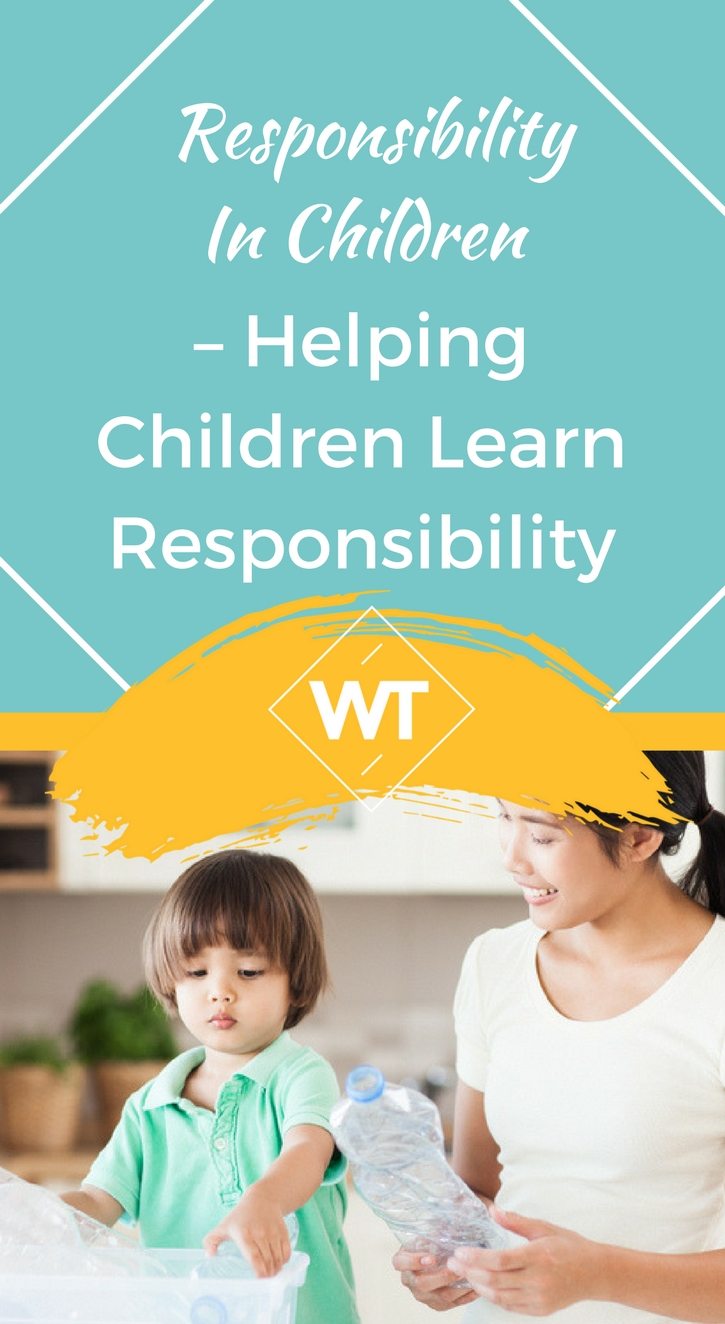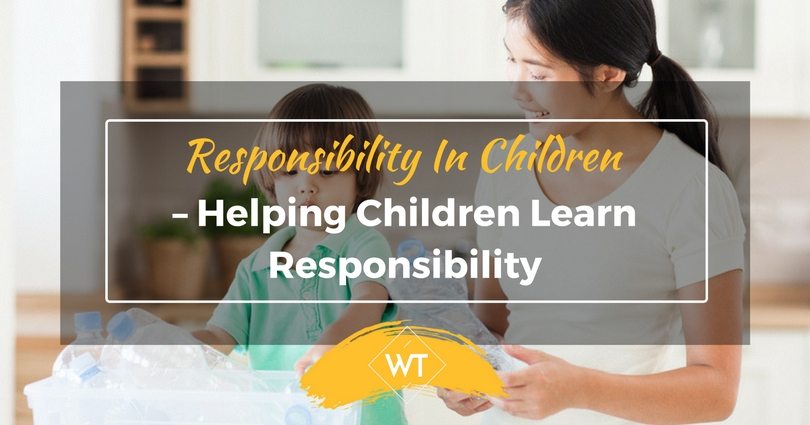Responsibility in Children – Helping Children Learn Responsibility

It’s a well known fact that learning starts at home. Children first start learning from their parents at home. Right from simple things such as eating, walking, etc the influence of parents or folks at home play an important role.
Learning is a continuous process for both children as well as parents because the way you teach or handle your child also changes with age, maturity and circumstances.
Inculcating Responsibility in Children
Responsibility includes duties or tasks as well as teaching kids how to be a responsible citizen or a good human being. In our discussion here, kids would also include grown up (adult) ones. We will look at a few ways of teaching responsibility in children, but the relevance of each would depend on the age, maturity of the kid and the environment/circumstances of the case. We will divide these in to four stages –
1. Small Kids (Age – less than 3)
2. Pre-School & later (Age – 3-8)
3. Growing Kids (Age – 9-12)
4. Teens (Age – 13-18)
Small Kids (Age – less than 3)
When a baby is born, it is just getting exposed to the outside world, so he/she likes to be cuddled, well cared for and needs attention all the time. Although the baby cannot do anything by itself it just learns by responding to people and surroundings. The baby learns simple things like how to call, respond or talk, which is good enough.
Once it becomes a toddler aged 1 or so it starts to move around, play, shout, etc. This is a stage when some kids learn to eat, talk, play and some learning can be imparted. Generally some good traits such as wishing guests, saying hello, responding to questions, etc can be imparted.
Pre-School & later (Age 3-8)
Once the kid gets closer to the age of 3 you will see a lot of shift away from infacy and move towards growth, energy and dynamism. At this stage in terms of teaching responsibility in children, you can teaching the following:-
- Simple routine tasks like how to eat, brush, dress, etc gradually from the age of 3
- Some grooming, training is also critical because this shapes their behavior in later part of their life
- Timing of activities – what needs to be done once you wake up, when to study, play, etc.
- A healthy communication is necessary – the kid should be free to discuss good news, problems, issues, ask questions, etc.
- Ensure that the kid is not listening to conversations or arguments between adults which gives them very bad exposure as well as sets bad examples.
At this stage kids not only learn a lot of things but also try to do it themselves. Some kids even learn to eat independently within a short span of time provided they are told or allowed to try. Ofcourse you have to teach and correct their mistakes. But they may have to be taught a few things like how to tie a shoe lace, wearing a T-shirt, etc.
Most parents worry about mistakes/accidents and try to spoon feed all the time – instead they should let the kid make some mistakes, and correct a few. Of course what you allow/disallow is purely dependant on your specific circumstances.
Most adults have the misconception that kids learn the maximum at school which is absolute rubbish. Most schools today test the parents as well so as to put some burden on them for their kid’s performance.
Schools are too caught up with commercial and academic aspects, that they hardly find time to give personal attention to each kids development.
You have to invest in this aspect. I’m sure no school or college taught you how to dress, how to save money, etc. Education is much beyond the school and starts at home by taking responsibilities.
Kids who have taken responsibilities at early age have also learnt how to become better citizens, better leaders/mangers as well as better parents later on in their lives. Stories, tales and morals taught at this stage will help them learn values – remember that old grandma tales have not lost their charms even in today’s hi-fi techno world.
Growing Kids (Age – 9-12)
By this time your child must be able to do his/her tasks independently as well as help you in small activities. For instance he/she would be able to do their routine tasks such as homework, getting ready for school, etc. In addition the kid should also be allowed to pitch in to help in small basic tasks such as opening/closing the door, operating taps, arranging books, etc.
Most parents try to blame the children or their spouse for the kid’s behavior which is counter-productive. Ultimately children are products of good or bad parenting – so focusing on the positive aspects will produce better results.
Use the following tips to teach responsibility in children in this age group.
Do’s & Dont’s
At this stage it is equally important to set an example first (or follow what you preach). If you tell them not to eat junk food often – you may have to follow that as well.
The Dos and Donts have to be clearly defined, but if the child has a dilemma or confusion encourage them to talk or discuss freely. Small mistakes can be excused with a warning, so that it is not repeated.
Most elders have the old fashioned habit of scolding or punishing a kid for some wrong doing – this needs to be done in case the kid does something wrong willfully, but finally you need to kindly put your soft message or intention also so that the kid appreciates this.
Lenience
Too much of cajoling or lenience despite misbehavior is guaranteed to give you trouble. Although the small misbehavior may be okay, the kid may sooner or later think that the wrong act is actually right. E.g. A kid that goes out to play with friends from 5-6 PM tries to stay back at a friend’s place till 7.30 PM. This is not reasonable because more playtime here is ruining studies other aspects (dinner, other work at home, etc).
Pitching in to Help
Kids at the stage must also be encouraged in helping you in cleaning, some kitchen work, washing, watering plants, etc. Its also a good practice to tell kids to set up the dinner table as well as wash their plates after dinner. You have to reward and encourage kids for good performance in academics, sports, extra curricular activities, etc.
Also avoid comparing your child with another one and saying “Look how X got 100% and his parents bought him a cycle”. When you have two or more kids treat them equally and encourage them in whatever way they are good – be it studies, sports, special talents, etc. Its common for parents to think that the kid which scores better marks is better than the other.
Success in life is not just about academic performance alone – remember that many Ph.Ds and Masters Degree holders worked for dropouts like Bill Gates, Michael Dell, etc.
Values, Discipline
These should have been imbibed strongly either through stories, sharing of experiences and incidents. Its important to explain to them that you are on their side as a well wisher.
This will make kids understand that when you say “No” its only meant for their well being. Also some discipline needs to be adhered to – but not a military regime. For instance prioritizing things like studies, play, exercise, additional reading, socializing, etc have to be done at appropriate times.
Exploratory Learning
In this age some kids want to explore as well as experience new things like going on a short trip with friends, active participation in sports, etc. Encourage them to pursue their interest but ensure that they are in good company and under supervision of responsible adult.
Here the encouragement is not for bad company, bad habits and associations. Some pocket money or spending can be allowed so that the kid learns to handle money judiciously and use it when required.
Teens (Age – 13-18)
The responsibilities that the child can handle become much larger because he or she is no longer a typical school kid but a grown up teenager. This is a crucial stage when kids transition in to becoming adults – so biologically as well as psychologically you will see lots of changes. However, kids who have been taught good values and positive interactions earlier will definitely shape up well and do well in different spheres.
Some of the points discussed for growing kids will apply here too, but there is one small change. The kid is no longer a ‘kid’ because he/she has grown up. Those in late teens will also seek some independence. They may not like your old cajoling, interferences, etc. However, you can maintain good relations without being too intrusive.
Responsibilities: At this stage most kids are good enough to handle what most adults do, but communicate freely to avoid misunderstanding.
You could now give children bigger responsibilities like some cooking tasks, cutting vegetables, depositing money in bank, paying bills, etc.
However, this does not mean they need to do these daily, instead they help you as and when they can. Appreciation and encouragement is also important. At this stage the kids must be told that they are also partners or key members of the family and inculcate a sense of ownership. When the ownership mindset occurs kids will also help you save bills, maintain your house in good condition, etc.
Ensure that they also don’t compromise on important priorities like studies, their personal development, etc. Collaboratively you can help children learn responsibility and raise responsible children
Most people talk about leadership and teamwork outside, but right in their home they don’t even move an inch. For e.g. they want someone to come and serve water which is right in front of them. Even a family should work as a team and work cohesively helping one another in order to achieve common goals.
Inculcating responsibility in children is crucial. Children being the future of India should try to pitch in and help their parents, so that they can get relief also from hard work after office hours or after hours of chores in the kitchen. Greater collaboration among family members can also help the household become a better place spreading happiness, prosperity and positive energy.









Leave a Reply